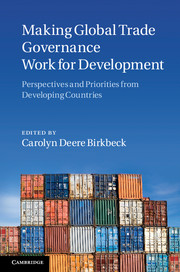 Making Global Trade Governance Work for Development
Making Global Trade Governance Work for Development Book contents
- Frontmatter
- Contents
- Figures
- Tables and boxes
- Contributors
- Acknowledgements
- Introduction
- Part I Global trade governance
- Part II Roles and responsibilities in global trade governance: diversity in developing country priorities and strategies
- 5 New powers in the club: the challenges of global trade governance
- 6 China’s ascent in global trade governance
- 7 LDC priorities for improved global trade governance
- 8 Priorities for small States in global trade governance
- 9 Improving the participation of small developing countries in the governance of the multilateral trading system
- Part III Strengthening multilateralism
- Part IV Making WTO negotiations and decision-making processes fairer
- Part V Conclusion
- Index
- References
8 - Priorities for small States in global trade governance
from Part II - Roles and responsibilities in global trade governance: diversity in developing country priorities and strategies
Published online by Cambridge University Press: 07 September 2011
- Frontmatter
- Contents
- Figures
- Tables and boxes
- Contributors
- Acknowledgements
- Introduction
- Part I Global trade governance
- Part II Roles and responsibilities in global trade governance: diversity in developing country priorities and strategies
- 5 New powers in the club: the challenges of global trade governance
- 6 China’s ascent in global trade governance
- 7 LDC priorities for improved global trade governance
- 8 Priorities for small States in global trade governance
- 9 Improving the participation of small developing countries in the governance of the multilateral trading system
- Part III Strengthening multilateralism
- Part IV Making WTO negotiations and decision-making processes fairer
- Part V Conclusion
- Index
- References
Summary
To make their participation in the multilateral trading system more effective and beneficial, small States are becoming increasingly vocal in their advocacy of their special interests as ‘small countries’. These efforts are attracting growing international attention. The extent to which one can make a compelling claim that systems for global trade governance should address the needs of small States, depends on whether one can establish the specificity of their interests. If the economic circumstances and needs of small States in the trading system were similar to those of other developing countries, they could simply rely on larger and more influential States to help advocate on their behalf. However, the ‘smallness’ of small States gives them unique characteristics, which in turn means that their trade interests are distinct from other countries. This chapter argues that to achieve the goals that they alone have a vested interest in securing in the multilateral trading system, small States themselves will have to secure the relevant changes, decisions and concessions.
- Type
- Chapter
- Information
- Making Global Trade Governance Work for DevelopmentPerspectives and Priorities from Developing Countries, pp. 204 - 230Publisher: Cambridge University PressPrint publication year: 2011
References
- 2
- Cited by


